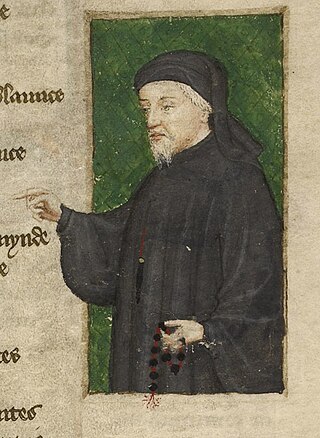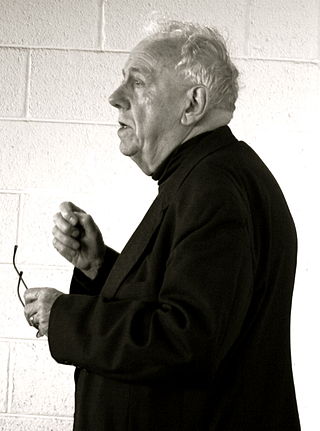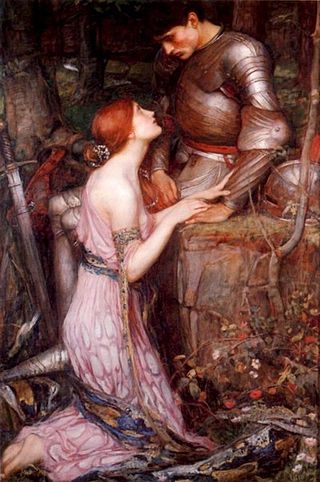Related Research Articles

Geoffrey Chaucer was an English poet,author,and civil servant best known for The Canterbury Tales. He has been called the "father of English literature",or,alternatively,the "father of English poetry". He was the first writer to be buried in what has since come to be called Poets' Corner,in Westminster Abbey. Chaucer also gained fame as a philosopher and astronomer,composing the scientific A Treatise on the Astrolabe for his 10-year-old son Lewis. He maintained a career in the civil service as a bureaucrat,courtier,diplomat,and member of parliament.

Piers Plowman or Visio Willelmi de Petro Ploughman is a Middle English allegorical narrative poem by William Langland. It is written in un-rhymed,alliterative verse divided into sections called passus.

Alasdair Chalmers MacIntyre is a Scottish-American philosopher who has contributed to moral and political philosophy as well as history of philosophy and theology. MacIntyre's After Virtue (1981) is one of the most important works of Anglophone moral and political philosophy in the 20th century. He is senior research fellow at the Centre for Contemporary Aristotelian Studies in Ethics and Politics (CASEP) at London Metropolitan University,emeritus Professor of Philosophy at the University of Notre Dame,and permanent senior distinguished research fellow at the Notre Dame Center for Ethics and Culture. During his lengthy academic career,he also taught at Brandeis University,Duke University,Vanderbilt University,and Boston University.

Troilus and Criseyde is an epic poem by Geoffrey Chaucer which re-tells in Middle English the tragic story of the lovers Troilus and Criseyde set against a backdrop of war during the siege of Troy. It was written in rime royale and probably completed during the mid-1380s. Many Chaucer scholars regard it as the poet's finest work. As a finished long poem,it is more self-contained than the better known but ultimately unfinished The Canterbury Tales. This poem is often considered the source of the phrase:"all good things must come to an end" (3.615).
Pierce the Ploughman's Crede is a medieval alliterative poem of 855 lines,lampooning the four orders of friars.

Sir John Clanvowe was a Welsh diplomat,poet and chamber knight to Richard II. He was born to a Marcher family and was possibly of mixed Anglo-Welsh origin,holding lands that would lie in the present-day Radnorshire district of Powys and in Herefordshire.

Medievalism is a system of belief and practice inspired by the Middle Ages of Europe,or by devotion to elements of that period,which have been expressed in areas such as architecture,literature,music,art,philosophy,scholarship,and various vehicles of popular culture. Since the 17th century,a variety of movements have used the medieval period as a model or inspiration for creative activity,including Romanticism,modern paganism,the Gothic revival,the pre-Raphaelite and arts and crafts movements,and neo-medievalism.
Benedict M. Ashley,O.P.,was an American theologian and philosopher who had a major influence on 20th century Catholic theology and ethics in America through his writing,teaching,and consulting with the United States Conference of Catholic Bishops. Author of 19 books,Ashley was a major exponent of the River Forest Thomism. Health Care Ethics,which he co-authored in 1975 and now in its fifth edition,continues to be a fundamental text in the field of Catholic Medical Ethics. Ashley taught at numerous institutions and was an active teacher,consultant,and author. He was a faculty member of the Institute for Advanced Physics,a physics research and educational organization reintegrating the foundational principles given directly through our senses into the heart of modern science,from 2003 till his death. He called the Institute for Advanced Physics "the first and only institution addressing this problem [the disintegration of secular and religious culture] at its core by integrating the proper philosophical depth into the heart of modern science."
Durant Waite Robertson Jr. was a scholar of medieval English literature and especially Geoffrey Chaucer. He taught at Princeton University from 1946 until his retirement in 1980 as the Murray Professor of English,and was "widely regarded as this [the twentieth] century's most influential Chaucer scholar".
Derek Albert Pearsall (1931–2021) was a prominent medievalist and Chaucerian who wrote and published widely on Chaucer,Langland,Gower,manuscript studies,and medieval history and culture.
The Trinity Gower D Scribe,often referred to simply as Scribe D,was a professional scribe and copyist of literary manuscripts active during the late fourteenth and early fifteenth century in London,England. Although his real name long remained unknown,Scribe D has been described as "so well known to students of late Middle English manuscripts that he hardly needs any introduction".
Literary nominalism is a paradigm of thought that is interested in the interconnections between certain aspects of nominalist philosophy and theology and works of literature.
The Laura Shannon Prize in Contemporary European Studies is a $10,000 book prize sponsored by the Nanovic Institute for European Studies at the University of Notre Dame. The Laura Shannon Prize is awarded annually to the author of the "best book in European studies that transcends a focus on any one country,state,or people to stimulate new ways of thinking about contemporary Europe as a whole." "Contemporary" is construed broadly,and books about particular countries or regions have done well in the process so long as there are implications for the remainder of Europe. The prize alternates between the humanities and history/social sciences. Nominations are typically due at the end of January each year and may be made by either authors or publishers. The final jury selects one book as the winner each year and has the discretion to award honorable mentions.
Anne Middleton was an American medievalist,and the Florence Green Bixby Professor of English at the University of California,Berkeley.

Affective piety is most commonly described as a style of highly emotional devotion to the humanity of Jesus,particularly in his infancy and his death,and to the joys and sorrows of the Virgin Mary. It was a major influence on many varieties of devotional literature in late-medieval Europe,both in Latin and in the vernaculars. This practice of prayer,reading,and meditation was often cultivated through visualization and concentration on vivid images of scenes from the Bible,Saints' Lives,Virgin Mary,Christ and religious symbols,feeling from the result. These images could be either conjured up in people's minds when they read or heard poetry and other pieces of religious literature,or they could gaze on manuscript illuminations and other pieces of art as they prayed and meditated on the scenes depicted. In either case,this style of affective meditation asked the "viewer" to engage with the scene as if she or he were physically present and to stir up feelings of love,fear,grief,and/or repentance for sin.
Carolyn Dinshaw is an American academic and author,who has specialised in issues of gender and sexuality in the medieval context.
William Franke is an American academic and philosopher,professor of Comparative Literature at Vanderbilt University. A main exposition of his philosophical thinking is A Philosophy of the Unsayable (2014),a book which dwells on the limits of language in order to open thought to the inconceivable. On this basis,the discourses of myth,mysticism,metaphysics,and the arts take on new and previously unsuspected types of meaning. This book is the object of a Syndicate Forum and of a collective volume of essays by diverse hands in the series “Palgrave Frontiers in Philosophy of Religion”:Contemporary Debates in Negative Theology and Philosophy. Franke's apophatic philosophy is based on his two-volume On What Cannot Be Said:Apophatic Discourses in Philosophy,Religion,Literature,and the Arts (2007),which reconstructs in the margins of philosophy a counter-tradition to the thought and culture of the Logos. Franke extends this philosophy in an intercultural direction,entering the field of comparative philosophy,with Apophatic Paths from Europe to China:Regions Without Borders. In On the Universality of What is Not:The Apophatic Turn in Critical Thinking, Franke argues for application of apophatic thinking in a variety of fields and across disciplines,from humanities to cognitive science,as key to reaching peaceful mutual understanding in a multicultural world riven by racial and gender conflict,religious antagonisms,and national and regional rivalries.
Alastair J. Minnis is a Northern Irish literary critic and historian of ideas who has written extensively about medieval literature,and contributed substantially to the study of late-medieval theology and philosophy. Having gained a first-class B.A. degree at the Queen's University of Belfast,he matriculated at Keble College,Oxford as a visiting graduate student,where he completed work on his Belfast Ph.D.,having been mentored by M.B. Parkes and Beryl Smalley. Following appointments at the Queen's University of Belfast and Bristol University,he was appointed Professor of Medieval Literature at the University of York;also Director of the Centre for Medieval Studies and later Head of English &Related Literature. From 2003 to 2006,he was a Humanities Distinguished Professor at Ohio State University,Columbus,from where he moved to Yale University. In 2008,he was named Douglas Tracy Smith Professor of English at Yale.
David Lyle Jeffrey is a Canadian-American scholar of literature and religion,currently a Distinguished Senior Fellow at the Baylor Institute for Studies in Religion. He was elected a Fellow of the Royal Society of Canada (1996-). In 2003 he was given the Lifetime Achievement Award of the Conference of Christianity and Literature.
Sebastian Sobecki is a medievalist specialising in English literature,history,and manuscript studies.
References
- ↑ Wisden 1968, p. 351.
- ↑ "David Aers". CricketArchive. Retrieved 14 September 2017.
- ↑ Aers, David. "Faculty Page". Duke University. Archived from the original on 8 March 2012. Retrieved 21 April 2012.
- ↑ Smith, Cabell (2 October 1998). "In the Land of Chaucer: Aers Brings Students Close to Medieval Literature". Dialogue.